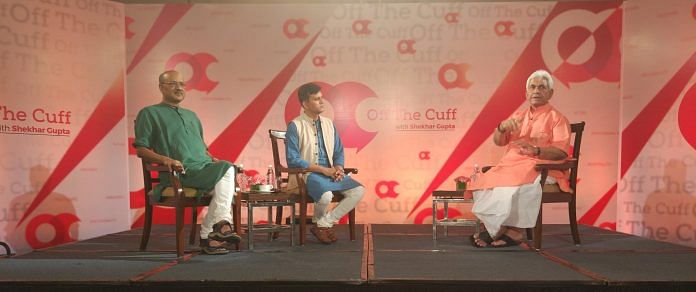‘We have the broad framework ready. It will be forward-looking, focus on sustainable growth and ease of doing business’.
New Delhi: The new telecom policy is expected to help consolidation in the sector that has been shaken by the entry of Jio, communication minster Manoj Sinha has said.
The draft of the new policy will be made public soon to seek feedback, Sinha said.
“We have the broad framework ready. It will be forward-looking, focus on sustainable growth and ease of doing business,” Sinha said. “The telecom sector will see consolidation and, ultimately, there will just be four to five players in the market.”
“The framework of the new telecom policy will be made public and open to comments soon,” he added.
The minister was speaking at ThePrint’s ‘Off The Cuff’ Tuesday, and was in conversation with Editor-in-Chief Shekhar Gupta and Associate Editor Kumar Anshuman.
The telecom sector has been in turmoil despite a widening customer base, which analysts say is largely due to the disruption caused by the entry of Reliance Jio in 2016. The race in the sector to match the competitive tariffs offered by Jio has hit revenues, they say.
As a result, many smaller players have been edged out of the market, and the ones still in play are struggling to survive amid rising debt and pricing wars to acquire more customers.
‘Lowest tariff in the world’
The minister said this wasn’t the first time a new player had caused turmoil in the market, and noted that Jio’s arrival, with its free voice calls and low-cost data services, had proved a boon for consumers.
“The gain from this is the tariff has come down significantly. Data tariffs in India are among the lowest in the world,” he added.
When asked about the “rona dhona” of telecom companies after Jio’s launch, Sinha said the government’s job was to address the grievances of all the players “so that they are in a situation where they can serve the customers”. “Because if they die, who will serve the nation?” he said.
“We have done whatever we could within the legal framework to ease the situation for other service providers who have been on the receiving end because of the disruption,” he added.
Good run for state-run players
Sinha expressed confidence about the performance of state-run telcos.
“BSNL is performing better than it used to, and has been posting operating profit in the last three years,” he said.
“The problem with BSNL was that, after 2006, it was not investing in upgrading its infrastructure and technology. Now, it is…it has rolled out 4G services in Karnataka and Kerela,” Sinha added.
“We are trying to bring in 4G in the entire country so that BSNL can stand along with the other market players,” he said.
He also projected a positive outlook for Indian Telephone Industries (ITI), the state-owned telecommunications equipment manufacturer. After posting losses for 17 years, ITI recorded a profit of Rs 19 crore in the last quarter. Sinha said he expected that, in the next few years, the company would “make profits to the tune of Rs 5,000 crore”.
“Four of the five units are running in profit and we are going to list the company on the bourses very shortly, for which the Cabinet has given approval,” he added.
‘Government, telcos working on call drops’
Asked about the vexing issue of call drops, Sinha said the government was working with telecom service providers (TSPs) to resolve the problem.
“We have formulated a system for this. TRAI (Telecom Regulatory Authority of India) has come out with a new report, and all our TSPs are abiding by the norms set by TRAI,” he added.
“We brought in the IVRS (interactive voice response system), wherein consumers receive a call and three to four questions are asked about call drops; then we send the responses to the telecom service providers and they take corrective measures,” he said.






